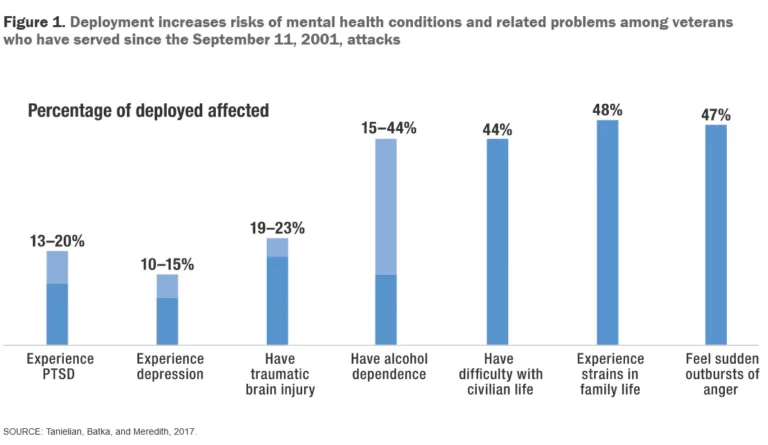
Earlier this year Representative Sheila Jackson Lee (TX18) introduced a bill into the house, HR 236 or the Battle-Buddy Check Week” bill which was also recently co-sponsored by Representative Paul Tonko (NY20). According to the text of the bill, it “requires the Department of Veterans Affairs (VA) to designate one week per year as Battle Buddy Check Week for the purposes of organizing outreach events and educating veterans on how to conduct peer wellness checks. The VA shall ensure that the Veterans Crisis Line has a plan for handling the potential increase in calls that may occur during such week” (Congress.gov, 2023).

The RAND Corporation conducted a study which was published in 2019. The primary purpose of the study was to identify strategies for improving the quality of mental health care for veterans.
The report stated, “[v]eterans are at increased risk for mental health conditions such as depression, anxiety, and post-traumatic stress disorder (PTSD) compared to the general population, and they often face barriers to accessing mental health care.” The study went on to say, “[i]mproving the quality of mental health care for veterans is a critical public health issue” (RAND, 2019). They sought to “identify key strategies for improving the quality of mental health care for veterans” and by drawing on RAND’s extensive research on mental health care for veterans, they were able to identify key challenges and promising strategies.
Here are the five key strategies that this report uncovered:
Overall this study highlighted a need for a comprehensive approach to improving mental healthcare for veterans. Though I agreed with everything this study outlined, I do think they missed a couple things.
First, I think art therapy should be included within “Evidence-Based Treatments”. Art therapy has a long history of effectiveness with dozens of peer-reviewed studies showcasing how including art therapy as part of a veteran’s overreaching treatment plan can positively impact results.
The other missing portion is family care and specifically providing treatment, counseling, and therapy not just for the veteran but for their family members. PTSD doesn’t just impact the veteran and the symptoms can have devastating effects on families. Providing care for families such as therapy, groups, art therapy options, and other care for the entire family of the veteran may have huge implications and dramatic results.
To sum it all up, though these representatives have their hearts in the right place, this is a real problem that needs real solutions, not just a week of mentions on social media and outreach efforts which the VA is hardly equipped to handle. We need an overhaul of the system, real reform to impact real change and produce effective results. I expect more out of our congressmen and women. In short, do better Rep Lee & Rep Tonko, we need results, not a new hashtag trend. Fortes fortuna adiuvat – fortune favors the brave.

Jaeson "Doc" Parsons
doc@graffitiofwar.com
Delivered by FeedBurner





Founder and CEO of The Graffiti of War Project, Doc is a decorated combat veteran of Operation Iraqi Freedom where he was a combat medic with the 54th Engineer Battalion. He is currently the a journalist for Force 12 Media and is featured weekly on SOFREP.com. Docas been featured in numerous media outlets such as Wired.com, Maxim.com and BusinessInsider.com. For more information about Jaeson “Doc” Parsons click HERE or send him an EMAIL.
RSS Feed
April 2023
March 2023
October 2020
June 2019
December 2018
November 2018
November 2016
April 2016
March 2016
February 2016
April 2015
May 2014
April 2013
October 2012
July 2012
December 2011
October 2011
September 2011
August 2011
July 2011
June 2011
May 2011
April 2011
March 2011
February 2011
January 2011
December 2010
November 2010
October 2010
July 2010
May 2010
April 2010
Copyright 2024 – The Graffiti of War Project